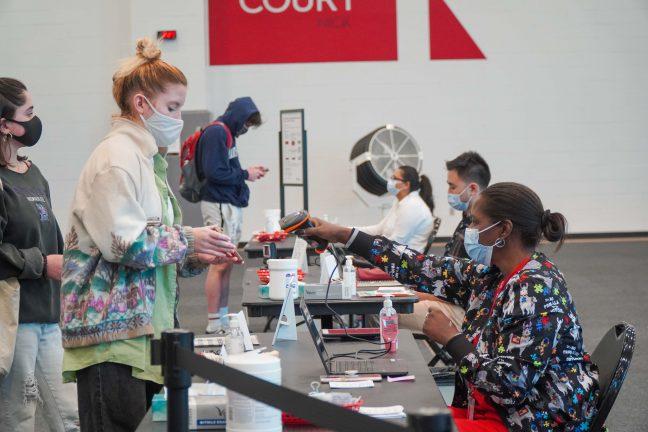The beginning of the 2022-2023 academic year at the University of Wisconsin is marked by significantly more relaxed COVID-19 policies and mitigation strategies on campus — reduced isolation housing for infected students, zero masking requirements and no enforcement of vaccination against the virus.
The start of this school year has also presented the university with a freshman class of roughly 8,600 students, surpassing last year’s record-breaking enrollment of 8,465 students. The campus housing assignment process was notably challenging last year, with occupancy adjustments in many residence hall rooms, communal lounges being converted into living quarters and the Lowell Center Hotel becoming a dormitory in order to house as many students as possible.
With an even larger influx of students this semester, housing challenges persist. Many of this year’s students are housed in triple, quadruple and even hextuple arrangements in the interest of accommodating high demand for campus housing. At the same time, isolation housing for students who test positive for COVID-19 has been reduced to a rather limited number of temporary quarantine rooms.
Residents who test positive for COVID-19 are no longer required to disclose this information. Rather than being housed in isolation to prevent the transmission of the virus, those who test positive have been advised to isolate in-place with their roommates. This also means continuing to use communal spaces, like bathrooms.
Madison and Dane County have been fluctuating between medium and high community levels of positive COVID-19 cases in recent months. Currently, Dane County is at medium levels with a case rate of 160.6 per 100,000 people, according to the CDC.
The transmissibility rates in Dane County provide more alarming metrics that demonstrate high risk of contracting and spreading the virus. The CDC has developed community levels and transmission levels as two separate measures to determine the severity of the virus regionally, but neither of these assessments can account for unreported cases.
The university highly encourages students to practice positive health behaviors in the interest of keeping campus safe, which falls in accordance with CDC guidelines. But, current recommendations are unenforceable since they are merely suggestions, not policies.
UW sophomore Amanda Curbelo lives in a residence hall and has taken note of the sharp difference between the university’s response to COVID-19 this year and last year.
“I think last year was definitely a lot better than where we’re at now,” Curbelo said. “One thing that I’ve noticed in particular is that the whole quarantining thing was a lot better for people who had a [COVID-19] positive roommate and a roommate who wasn’t testing positive. [The university] would separate them … it definitely feels a lot more unsafe [now].”
Fellow UW sophomore Owen Szot said he believes students should still be wearing masks in lecture hall settings in order to reduce the spread of COVID-19 and to protect students who are still exercising caution. He believes attending large lectures without the protection of a mask is dangerous for everyone.
“I feel like it was very premature and — even I would go so far as to say — irresponsible of the campus administration to have a full lifting of the mask mandate,” Szot said. “I think that the university is absolutely failing students who are immunocompromised. I think there should definitely be more guidelines in place for safety.”
Remiss guidelines surrounding suspected cases of COVID-19 create the potential for many cases to go unreported. This is a deeply concerning reality, considering the virus that has already killed 6.5 million people worldwide and has shaved almost three years off of the provisional human life expectancy. Returning to “normal” implies that we collectively disregard the impact of the ongoing pandemic.
While many have made the decision to exercise little caution in regards to the pandemic, not everyone is afforded such privilege.
“To fellow students — be smart, be considerate and be grateful that you can have the privilege of saying, like, ‘well, if I get COVID, I’ll be fine,’ because not everybody has that. There [are] lots of people that you are affecting if you do that,” Curbelo said.
Evidently, there’s a looming “survival of the fittest” mentality surrounding COVID-19 that has made existing on campus unsafe for immunocompromised students. The absence of policy can be attributed to systemic ableism that informs administrative decisions.
COVID-19 infection often presents more than just flu-like manifestations, and its post-viral effects, such as long COVID-19, include a host of symptoms that can dramatically alter one’s quality of life, according to Mayo Clinic. Millions of Americans have been affected by long term post-COVID-19 conditions, and many are now identifying as disabled.
While vaccination does decrease the likelihood of developing long COVID-19, it does not entirely eliminate risk. The CDC has outlined evidence to prove that one-in-five Americans that have previously tested positive for COVID-19 exhibit characteristics of long COVID-19.
Somehow, a virus that can cause severe, long-term effects has not swayed leaders to respect the needs of our most vulnerable community members. Frustrated community members have started calling for the enforcement of stricter COVID-19 policies.
In early August, a group of workers and community members released an open letter addressed to UW Chancellor Jennifer Mnookin and the UW COVID-19 response team. The letter outlines the implications of long COVID-19 and the high transmissibility of newer variants. It also offers a list of protective measures that should be implemented to protect our campus community. Clearly reflecting the interests of many community members, the letter has since gained the support of more than 150 signees.
Without proper public health and legislative guidance, it is up to every single one of us to prevent further transmission of COVID-19. In the absence of policy and mandates, we can still take individual actions to collectively mitigate damage the pandemic causes.
Until the university takes responsibility to adequately protect its most vulnerable, you must do your part — everyone’s future depends on it.
Katie Sullivan (kbsullivan2@wisc.edu) is a sophomore studying health promotion & health equity and communication sciences & disorders.


